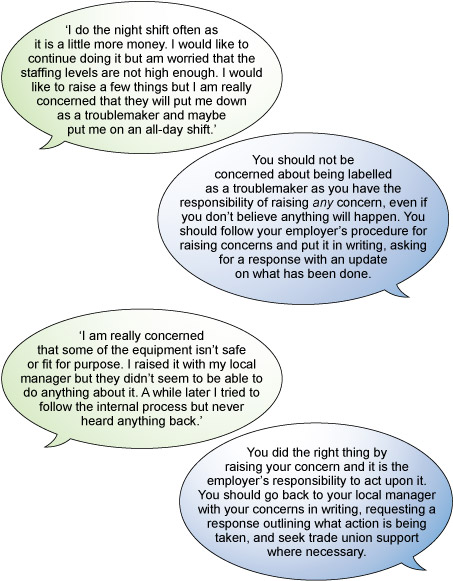3 Whistleblowing
If you think there may be some form of wrongdoing or misconduct in your workplace, you need to raise your concerns about it: this is known as whistleblowing, or ‘raising concerns’ in the NHS. Under the Public Interest Disclosure Act (1998) workers have a right to ‘blow the whistle’ if management instructions are conflicting with their duty to act in the public interest.
Examples might include where you believe that healthcare practices or equipment are dangerously unsafe; where there is abuse of patients or staff; substance misuse (alcohol or drugs); violence or bullying; or there has been serious misuse of funds or resources (for example fraud or waste).
Next, Gail will describe her understanding of whistleblowing and how it might arise for a healthcare assistant working in a hospital setting.
Transcript: Whistleblowing
Every employer should have a whistleblowing procedure in place to facilitate the disclosure of this kind of sensitive information, which may be along the lines of the following process issued by the UNISON union:
Steps to raising a concern:
- know how to raise a concern
- find out who is affected
- gather evidence
- put your concerns in writing
- specify what outcome you are seeking
- ask for a written response
- seek trade union support if necessary
If you are concerned about something and thinking of talking to someone about it, get support: this could be from your trade union, the appropriate person in your workplace or a ‘whistleblowing guardian’.
The following statements have been taken from healthcare assistants who are thinking about raising an issue within their workplace. While reading them, think about what you might do in each situation.
Activity 1
Health Education England have published a video on raising concerns in healthcare. Watch the video now and try to place yourself in the shoes of the people who had to report wrongdoing. Would you have the courage to report failures in the system where you work?
Transcript: Raising concerns: speaking up about patient safety
[MUSIC PLAYING]
[BEEPING]
[MUSIC PLAYING]
The film you have just seen was made with the purpose of supporting healthcare professionals at all levels, ensuring they feel empowered to both raise and respond to concerns. In it you saw a range of scenarios that you could encounter where patient safety may be put at risk. Challenging behaviours or seeking advice may not always be easy, but it is important that you know who you would speak to in order to raise your concerns. The film also signposts to regulatory bodies, unions and independent advice websites where you can find more information on speaking out.
2 Accountability

